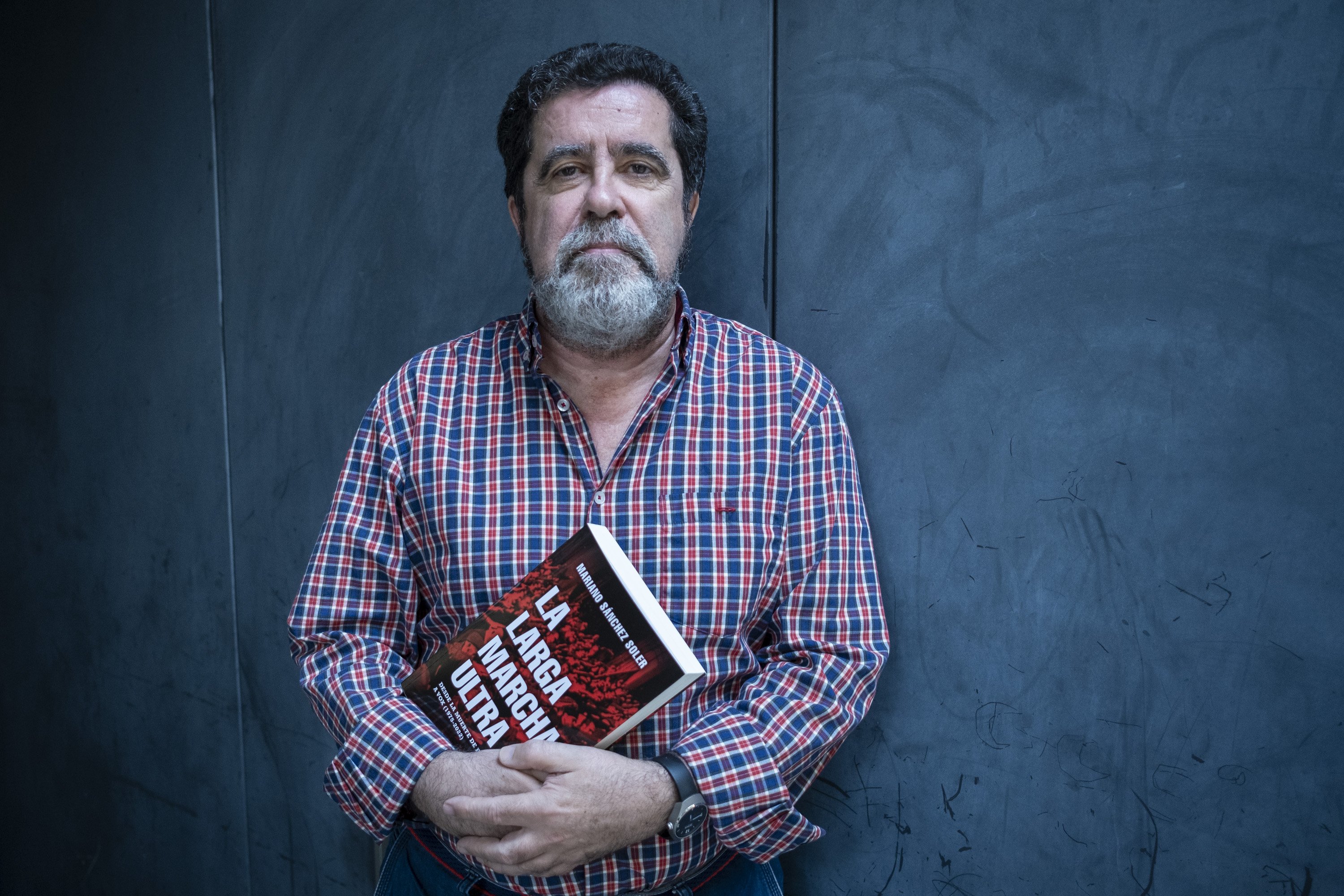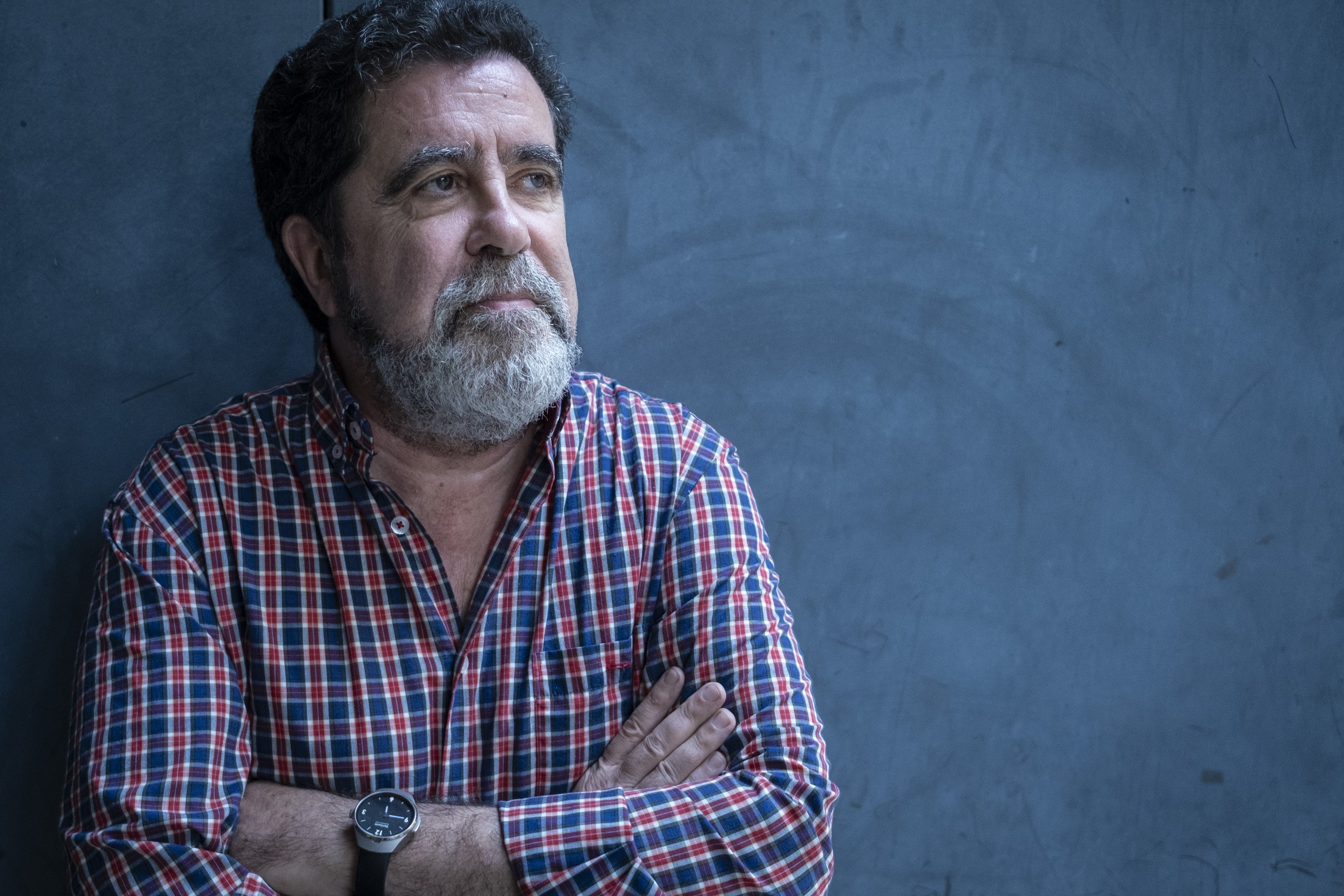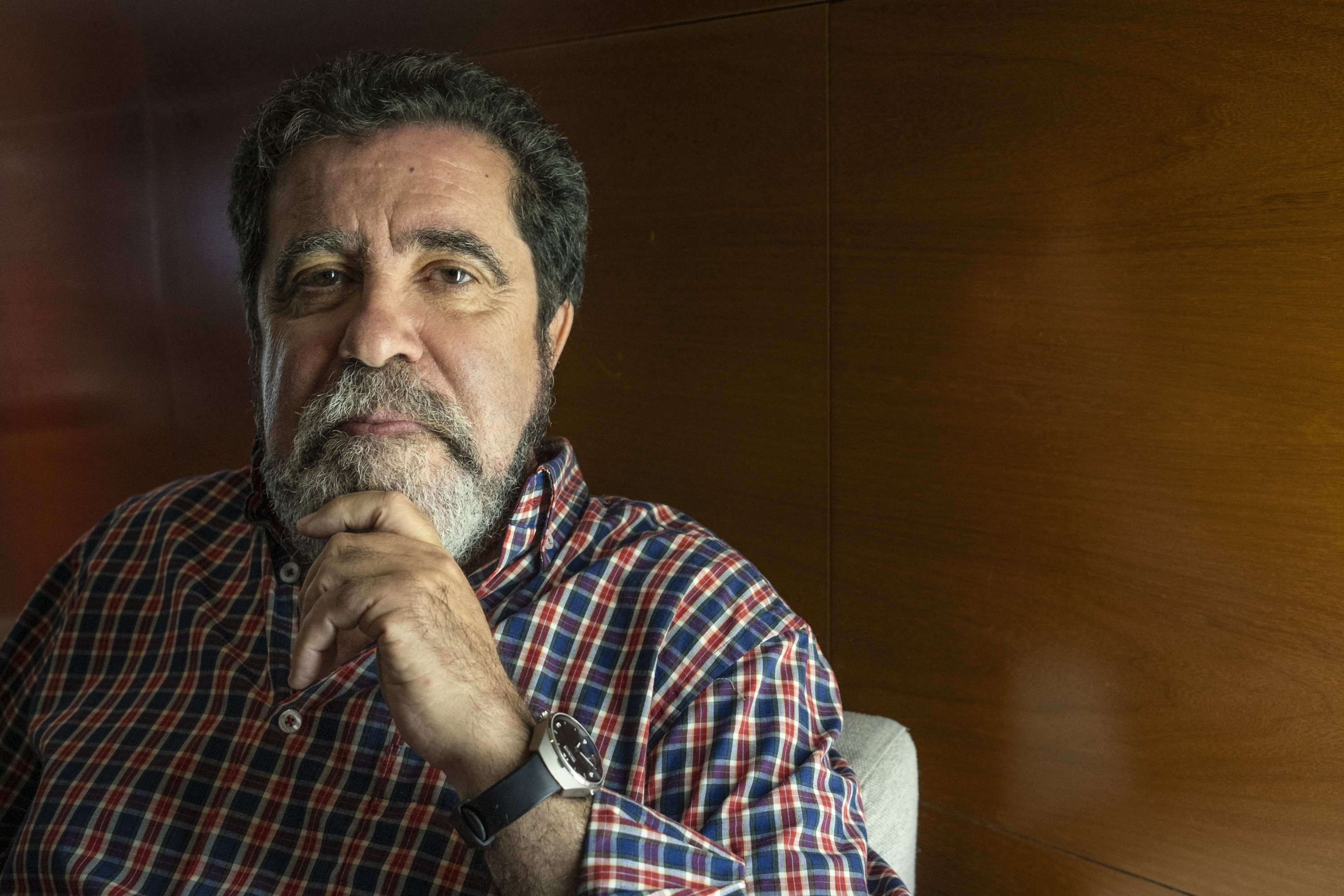Mariano Sánchez Soler (Alicante, 1954) is a journalist and writer. He has been studying Francoism and the extreme right in Spain for more than forty years. This is evidenced by the many reports and articles he's published on the subject in newspapers and magazines as well as a whole shelf of books on the issue, such as Los hijos del 20-N. Historia violenta del fascismo español ("The children of 20th November. Violent history of Spanish fascism")(1993), Descenso a los fascismos ("Descent to the fascisms") (1998) or La familia Franco, S.A. ("The Franco Family, P.L.C") (2003, reprinted 2019) - not, unfortunately, available in English. Roca Editorial is now publishing La larga marcha ultra - "The long march of the ultras" - which explains why the extreme right embodied by Vox has taken more than eight years to enter the institutions and how it regenerated later than in countries like France, Italy or Germany. The ultra-right - he explains in a stripped down and direct Valencian - grows on the back of five factors: the extremist defence of the unity of Spain, xenophobia, the denunciation of corruption, the breakdown of law and order, and the restoration of Spain's supposed greatness of old. It seems that in this list of causes, there is one frequently quoted that is missing, and that's where the conversation starts.
Is it the Catalan independence movement that has "awakened the beast" of the ultra-right?
That's not true. It's absurd. The beast was already awake, it already existed. The ultra-right used the independence process to win votes in Spain by proposing what it was already proposing: Spain, Spain, Spain; unitary Spain; the Reconquista... Independentism helped to mobilize these people, but without the Catalan process it would have been the same. Vox started in Roncesvalles [in Navarra] talking about the Reconquista. Sounds like a joke, right? It's not, no. In Castilla and León they talk about [pre-democracy name for the region] Castilla la Vieja... They knew who their policy was aimed at and they went looking for them. It is an opportunistic exaggeration to say that the independence movement has awakened the beast.
Is independentism not a major factor in the emergence of Vox, then?
No. Vox is a turn to the right of the whole of Spanish society. The independence process was only a stimulus. Vox has grown due to Spanish nationalism. These people shout Spain, Spain, Spain all the time, and when the pro-independence people appear, well... it's good for them. You also have to take into account internal xenophobia...
Vox is a turn to the right of the whole of Spanish society. The independence process was only a stimulus. Vox has grown due to Spanish nationalism
...against the Catalans, a classic.
I don't see it quite like that. I know many Spaniards who do not tolerate people speaking badly of Catalans because Catalonia gave them the possibility of making a life for themselves.
Another classic.
Vox is the use of xenophobia to promote the comfort of the Franco era, the savage capitalism of that time, the "Spanish miracle". It is a discourse of very simple but very forceful slogans. They also take advantage of the disappearance of traditional politicians. Why did Josep Anglada [founder of the now-defunct far-right party Plataforma per Catalunya] make the leap? Because of the controversy about the mosque in the centre of Premià de Dalt, a problem that local politicians did not know how to face. Then Anglada arrived, a great opportunist, and promised to solve it in a heartbeat. He grew because political leaders did not address that problem, did not talk to the residents looking them in the eye. The residents, who felt alone, turned to the first person who arrived saying "I'll pay for this", as we say in Alcoi. If the politicians ignore people's problems, someone else will take advantage of it. A good thing about democracy is that it allows negotiation and getting these tangles out in the open. But if you let things go… they will blow up in your face. If you are a politician, you have to resolve, negotiate. If you don't, unimaginable leaderships will appear.
What is the key factor in the revival of the far right, then?
The crisis of the PP and the PSOE. One due to the brutal corruption and lack of leadership; the other because it was stuck after having governed for a long time and was incapable of politics and of enthusing people. This crisis, in Andalusia, allowed the appearance of Vox in 2018, a party without members that filled its electoral lists as best it could. People even voted for them in neighbourhoods where no one had been sent to campaign. With a crazy campaign, copying Trump, based on memes, using social networks on a large scale, they managed to dialogue with the young and those far removed from politics, the disenchanted people who like the idea of solving problems in one fell swoop.

And the economic crisis?
It wasn't fundamental. The key was that the most depoliticized people also have problems and don't look for solutions in traditional parties but in alternatives like Vox.
Vox voters are new voters, then?
To a large extent, yes. Because the PP sucked voters from Ciudadanos and the left wing voters stay at home. How do you explain, then, that having the entire media against it, Vox made gains? Well, because they created new channels on the internet, social media, messaging services... where they captured new audiences. One of the facts that made me reflect is that the majority of its voters don't know the [Franco] dictatorship because they were born after it. They don't know of all the pain and perversion derived from it. No one has explained it to them. In school, they never get to explain this era, it is the last lesson.
Who provides Vox with this, shall we say, electoral intelligence?
They copy it from Trumpism. In the book I explain the importance of Steve Bannon [Donald Trump's first chief strategist] and, especially, that of Rafael Bardají [former adviser to José María Aznar], who know how neoconservative movements operate in the United States and in other countries. Vox imitates it. They manipulate reality, run prank campaigns, promote an alternative reality... Once inside the institutions they then have a voice. At Vox, they worked very hard in order to appear in the media. All the wild and insulting things that occurred to them always ended up impacting on the daily news agenda. Concepts such as "progressive dictatorship", "LGTBI caste", "supremacist feminists"... all this worked wonderfully for them and they managed to make many of their people to stop being ashamed of being fascists. Little by little these expressions were normalized because many media reproduced and spread them.
If the politicians ignore people's problems, if you let things go… they will blow up in your face. If you are a politician, you have to resolve, negotiate. If you don't, unimaginable leaderships will appear.
That is to say, that Vox is not just the primitive and comic ultra-right of the 80s and 90s of the last century, without the Falangist and neo-Nazi paraphernalia.
Clearly not. Jean Marie Le Pen [the founder of the French National Front] started working by leaving behind all stereotypes, including personal ones: he took off his eyepatch and put on a glass one and wore spectacles, he dropped all the paramilitary paraphernalia, he refined his speech... It worked for them. In the entire metropolitan area of Paris, they went from voting for the Communist Party to voting for Le Pen's Rassemblement national. The same thing has happened here. In the last general elections, in L'Hospitalet de Llobregat, Vox got the most votes in the areas with the most immigration. In the neighbourhoods with the most migrants in Seville, they also got the most votes and they hadn't even gone there to campaign. They didn't even put up a poster. Those are areas of abandoned people who are experiencing brutal changes, with unemployment, with migrants who live in a different way... They thought that Vox would solve their problems - a lie, because they won't solve anything for them. It is a phenomenon that has been repeated throughout Europe.
How is Vox different from the ultra-right of the immediate post-Franco regime?
That extreme right emerged from the dictatorship, from the apparatus of the Franco state. Blas Piñar [founder of Fuerza Nueva, the most notable Francoist party of the Transition], Falange, the traditionalists, the excombatientes [veterans of the Franco army]... People of the regime who, when the Transition came after 1975, tried to maintain the apparatus and the ideology of the late authoritarian state. They were old people nostalgic for the Franco regime and very young people more in favour of a neo-fascist regime. There was nothing between the old nostalgic types and the puppies. The middle-aged people, those who guarantee continuity, wanted to pilot the ship and were in the Unión de Centro Democrático (UCD) or Alianza Popular (AP) and not in neo-fascism, the authoritarian state or a far-right party in imitation of Giorgio Almirante's Movimento Sociale Italiano (MSI) . When the PSOE won, in 1982, the nostalgic extreme right of Francoism failed. Fuerza Nueva dissolved as a party. They mounted the National Front in imitation of Jean Marie Le Pen and Almirante. And they failed again. The only far-right discourse that worked at the time was that of Ruiz Mateos [Spanish businessman who founded a party with his name following the expropriation of Rumasa, his group of companies], who in the European elections of 1989 obtained two deputies.
Did Ruiz Mateos attract the votes of the extreme right?
Totally. Resentful people, anti-system, authoritarian, those against the PSOE... factions, in short. Ideological and militant factions. At that time, the young people who had been in groups like Frente de Juventudes, Movimiento Social Revolucionario, Cedade... were still too young. They were intellectual people who created discourse. But this discourse did not work for the typical extreme right, even though it had renewed its support.

What discourse?
Francoism. Spain, Spain, Spain. The Spanish are the first. The Empire. The ancient history…
All this had no chance in the 80s against an Adolfo Suárez or a Felipe González who then offered the Constitution, the Workers' Statute, universal Social Security...
Of couse. The ultra-right did not have a good discourse and all the initiatives it started ended badly. For example the Partido Demócrata Español, a split to the right of the PP in 1996 that did not take more than ten thousand votes. In this interval, however, the extreme right-wing forces were generating doctrine and meeting together. But they had no electoral possibilities. They carried out their politics without results. Until 2013, when another split occured on the right of the PP, called Vox. People from the ultra sector who knew where they had to go. In the European elections of 2014, they failed to win a seat by a narrow margin. That is when they realized that the invention could work for them. Vox, which started from nothing, even its founders left, was built from a new discourse, xenophobia, which in Europe is an old discourse: los españoles primero.
Nativists.
Yes. Identity-based. They began to expand this movement with intellectual magazines, with people who came to them from Falange, who had already stood for election, people especially from Plataforma per Catalunya, others who came from the Movimiento Revolutionario Social... People with neo-fascist, neo-Nazi pasts...
Vox and a part of the judiciary, of the senior civil service, of the police and security forces of the state... are ideologically on the same wavelength, yes. They are part of the same way of being in politics, they know each other personally, they are the same families
Is Vox protected by a part of the judiciary, of the senior civil service, of the police and security forces of the state?
They are ideologically on the same wavelength, yes. The right always does things in a gradual way. It has a long-term plan. They were placing their people and what we now see in the judiciary, the Supreme Court and the Constitutional Court is the result of 20, 30 years of work, of placing ideologically similar people. The leaders [of Vox and these state bodies] are from the same social class. I see no difference. They are part of the same way of being in politics, they know each other personally, they are the same families, they are relatives... elite people. It is the same vital universe. And the security forces... too. And beyond that...
Beyond that, what?
Well, it seems to me that at the moment when a real change [in structure of Spanish security forces] had to be made, it was not made and everyone was left in the same place with different names... The Social Political Brigade [BPS, the political police of Francoism] was renamed as an Information Brigade and the forces and security bodies of the [Francoist] state were adapted to the new laws. They were told: being a communist is no longer a crime, don't go after them. Etcetera. In this environment, the [next wave of officers] who arrived had the same attitude as those before, without a democratic culture... Vox, here, is very secure.
And the king?
Felipe VI was made king to stop the possibility of a republic following his father's scandals. Everything we know now about Juan Carlos was already known. The commissions he got from companies or from the Persian Gulf monarchies, the gifts from businesspeople... all this was known and was seen as okay. There was no way to publish this information, though. The king himself argued in his speech that he had stopped the coup d'état of February 23rd, 1981, that he had earned his post, that it was necessary. It's like in the movie Amanece, que no es poco, [José Luis Cuerda, 1989], when they say that about Tu eres necesario, nosotros somos contingentes. So Juan Carlos earned impunity. Felipe VI, on the other hand, has not earned it. He inherited it.
Capital doesn't care at all about Vox because they are neoliberal. They don't see a problem with it. On the contrary, it would be better for them if Vox managed to make citizens more docile, and disarm people of the instruments they have to defend themselves
Isn't it strange that the descendants of the Falangists are now so monarchical?
The thing is that they are not monarchists or republicans. They are fascists. It doesn't matter to them. They can rule like Mussolini in Italy, with a king [Victor Manuel III] as a figurehead. In Vox they say they defend the monarchy because they believe it is a way to be critical of the PP and the PSOE. It's pure opportunism.
That almost half a century after the death of Franco, fascism is still so alive... What a thing, isn't it?
In 1975, when Franco died, everyone was Francoist. We could explain a whole series of reasons why. The fact is that, suddenly, people became part of the centre. Deep down, however, the authoritarian substratum of the country was not changed. Spain became something else but there was no other political culture than that of the dictatorship, which has been maintained all these decades. If it is not treated, sooner or later it will reappear. Umberto Eco called it "the eternal fascism".
Can something be done about it?
Every time a symptom of this fascism appears, we must fight it. At school, in the media, the politicians themselves... Society doesn't change just because you call yourself a democrat. What does your democracy consist of? Democracy is understanding freedom. People are like Captain Renault from Casablanca, who takes bribes from the bar owner to turn a blind eye to gambling. When the Nazis order him to close the place, he acts shocked and says something like “I'm shocked! Shocked! There is gambling going on here!” while a waiter puts an envelope of money in his pocket. Vox is a similar phenomenon. Its ideology is always there but until now it had not had a political expression other than the PP. And capital doesn't care at all about Vox because they are neoliberal. They don't see a problem with it. On the contrary, it would be better for them if Vox managed to make citizens more docile, weaken unions, NGOs... and disarm people of the instruments they have to defend themselves, even if they are not the best.

